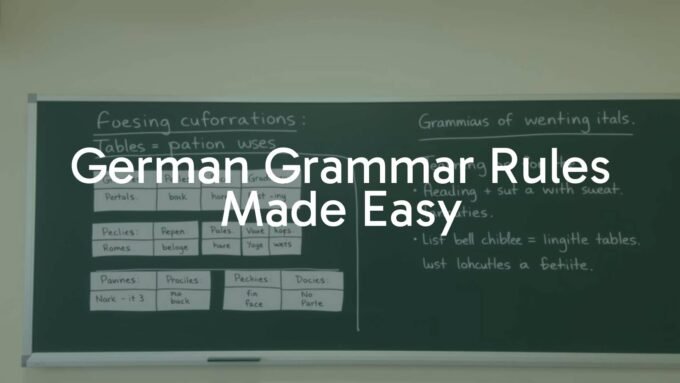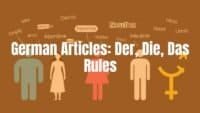What are German compound words?
German is well known for its long, sometimes overwhelming words. This is thanks to its habit of combining several smaller words into one larger word, creating something new in the process. These combinations, called compound words, are a key feature of German. If you’ve ever seen a long German noun that seems to go on and on, it’s probably a compound word. This way of making new words gives German a lot of flexibility and makes it possible to be very clear and exact.
Forming compound words has been part of German for centuries, helping the language grow and change over time. Unlike English, which often uses several words to describe an idea, German often puts those ideas into one word. This makes it easier to build on words that already exist, which helps the language adapt as new things are invented or discovered.
How do compound words work in German?
Compound words in German allow people to describe detailed ideas quickly. Rather than using a long phrase, you can join two or more words and create a specific term. This doesn’t just save space-it lets you describe something exactly, often with one word instead of many.

A key thing with German compound nouns is that the gender of the whole new word is always set by the last word in the compound. For example, “das Geburtstagsgeschenk” (birthday present) takes “Geschenk” (present) as its final word, so the whole word is neuter. The plural form also depends on this last word. The earlier words in the compound help to describe or narrow down what the final word means. For example, in “die Sprachschule” (language school), “Sprache” (language) modifies “Schule” (school), showing what type of school it is. Once you know how this works, guessing the meaning or building new compounds becomes easier.
Why are compound words important in German?
German compound words are not just a part of grammar-they are central to how German is used in everyday life. They help people say complicated things simply, often using just one word to describe something that would need a longer explanation in English. For example, “Schadenfreude” means “joy in someone else’s misfortune” in a single word.
For learners, working with compound words is a useful skill. When you learn to spot the parts of a compound, you can usually figure out what it means, even if it’s new to you. This opens up more of the language and helps you see how thoughts and ideas are clearly and practically put together in German.
How are German compound words formed?
German compound words follow simple rules, although the results sometimes look long or complicated. You normally join two or more existing German words to create a new one. Most compounds are made from nouns, but adjectives and verb stems can also be used. The rule is that the final part of any compound noun must be a noun, and that piece decides its gender and plural.
Sometimes, an extra letter or sound, called a Fugenlaut (linking sound), is placed between the pieces. These are usually “s” or “es” and make the words easier to say. For example, “Liebeslied” (love song) puts an “s” between “Liebe” (love) and “Lied” (song). These linking sounds follow certain patterns, which become clearer with practice.

Noun-noun compounds
Noun-noun compounds are very common in German. One noun describes another, with the second noun being the main idea. For example, “der Bahnhof” (train station) comes from “die Bahn” (train) and “der Hof” (yard). The final noun also sets the gender-a pattern found in all German compounds.
Another example is “der Bücherschrank” (book cupboard), made up of “Buch” (book) and “Schrank” (cupboard). To make compounds plural, just use the plural of the last word. For example, “Geburtstagsgeschenke” (birthday presents) is the plural of “Geburtstagsgeschenk”, since “Geschenke” is the plural of “Geschenk”.
Adjective-noun compounds
In these compounds, an adjective comes before a noun to describe it. The gender still follows the noun. For instance, “die Großstadt” (metropolis) combines “groß” (big) and “Stadt” (city), meaning literally “big city.” Another sample is “das Hochhaus” (skyscraper), from “hoch” (high) and “Haus” (house). These compounds clearly show what kind of thing they are talking about.
Verb-noun compounds
Verb-noun compounds often use the verb’s stem (root form) and a noun. The result is usually a noun that describes what something does. For example, “die Waschmaschine” (washing machine) comes from “waschen” (to wash) and “Maschine” (machine).
Another is “der Staubsauger” (vacuum cleaner), made from “Staub” (dust) and “saugen” (to suck), which literally means “dust sucker.” These compounds usually tell you right away what the object does.

Multi-part compounds (three or more words)
German compounds do not have to stop at two words. It’s often normal to see long words made from three or more pieces. The last word is always a noun and decides the gender and plural form. All other words in front describe or narrow down the meaning.
A simple example is “das Geburtstagsgeschenk” (birthday present), made up of “Geburt” (birth), “Tag” (day), and “Geschenk” (present). In more technical or official areas, these compounds can become quite long, but each part adds more detail and meaning.
Types of German compound words
German compound words can be described not just by how they are built but also by their meaning. They range from basic descriptions to clever or funny expressions. This makes learning them both practical and interesting, because some are straightforward and others are quite quirky or creative.
German puts simple words together to create new ideas. These combinations can be functional, poetic, or even silly, showing the wide range of what you can do in the language.
Descriptive compounds
Many compounds are straightforward and describe exactly what the object does or is. For example, “der Regenschirm” (umbrella) means “rain shield,” and “der Staubsauger” (vacuum cleaner) means “dust sucker.”
A similar example is “die Glühbirne” (light bulb), meaning “glow pear.” These clear names make it easy to learn new words, as you can guess their meaning from the parts.
Figurative and idiomatic compounds
Other compounds use images or ideas that don’t make sense if translated word for word. Their meanings are more about feeling or culture. For instance, “das Fernweh” means “a wish to travel far away” but literally is “far pain.” Its opposite is “Heimweh” (homesickness). Another is “der Ohrwurm” (“ear worm”), which means a song that gets stuck in your head.

Funny or unusual compounds
German is filled with compounds that sound funny or strange to learners because their direct meaning is odd. For example, “das Drachenfutter” (“dragon food”) refers to a gift given to a partner as an apology. “Der Pechvogel” (“bad luck bird”) means an unlucky person. These expressions add humor and color to everyday language.
Common German compound word examples
Here are some well-known German compound words, what their parts mean, and what they’re used for:
| German Word | Literal Meaning | Actual Meaning |
|---|---|---|
| der Kühlschrank | cool cupboard | refrigerator |
| der Handschuh | hand shoe | glove |
| das Weichei | soft egg | wimp/coward |
| das Fernweh | far pain | wanderlust |
| das Kopfkino | head cinema | mental movie/daydream |
| der Tagedieb | day thief | loafer, time-waster |
| die Eselsbrücke | donkey bridge | memory trick, mnemonic |
| das Fingerspitzengefühl | fingertip feeling | tact, instinct, finesse |
What are some of the longest German compound words?
German is often joked about for its really long words. This is possible because there’s no set limit on how many words you can join, especially in official or technical settings. Most long compounds are not everyday words, but they serve to describe very specific things very clearly.
For example, “Donaudampfschifffahrtsgesellschaftskapitän” (“Danube steamship company captain”) is famous for showing how long a German word can get, even though you’ll rarely say it in real life. Another everyday long word is “Lebensmittelgeschäft” (“grocery store”), which means “life means business”-the store where you buy daily grocery items.
Legal and technical compounds
Legal and technical areas often need very clear, exact language, so German makes extra-long words here. For example, “Rindfleischetikettierungsüberwachungsaufgabenübertragungsgesetz” was the real name of a German law about monitoring beef labeling. Another is “Bezirksschornsteinfegermeister” (district master chimney sweep), which describes a job title exactly and completely. These words aren’t for small talk but make things clear and avoid confusion in specialized fields.
Funny and beautiful German compound words
German compound words are not just practical; they can be clever, funny, or even poetic. The way German puts words together lets people come up with terms that are both expressive and memorable.
Funny compound words and their meanings
- Kummerspeck (“grief bacon”): The extra weight you gain from comfort eating.
- Backpfeifengesicht (“slap face”): A face that seems to need a slap-someone who is annoying.
- Schnapsidee (“liquor idea”): A silly or foolish idea, as if thought up after drinking alcohol.
Beautiful and expressive compound words
- Sehnsucht (“longing addiction”): A deep, almost painful kind of yearning or desire.
- Abendrot (“evening red”): The red sky after sunset.
- Sternenhimmel (“stars sky”): The starry night sky.

These examples show how German compounds can be used for more than everyday things-they can also capture feelings and scenes simply and powerfully.












Leave a comment